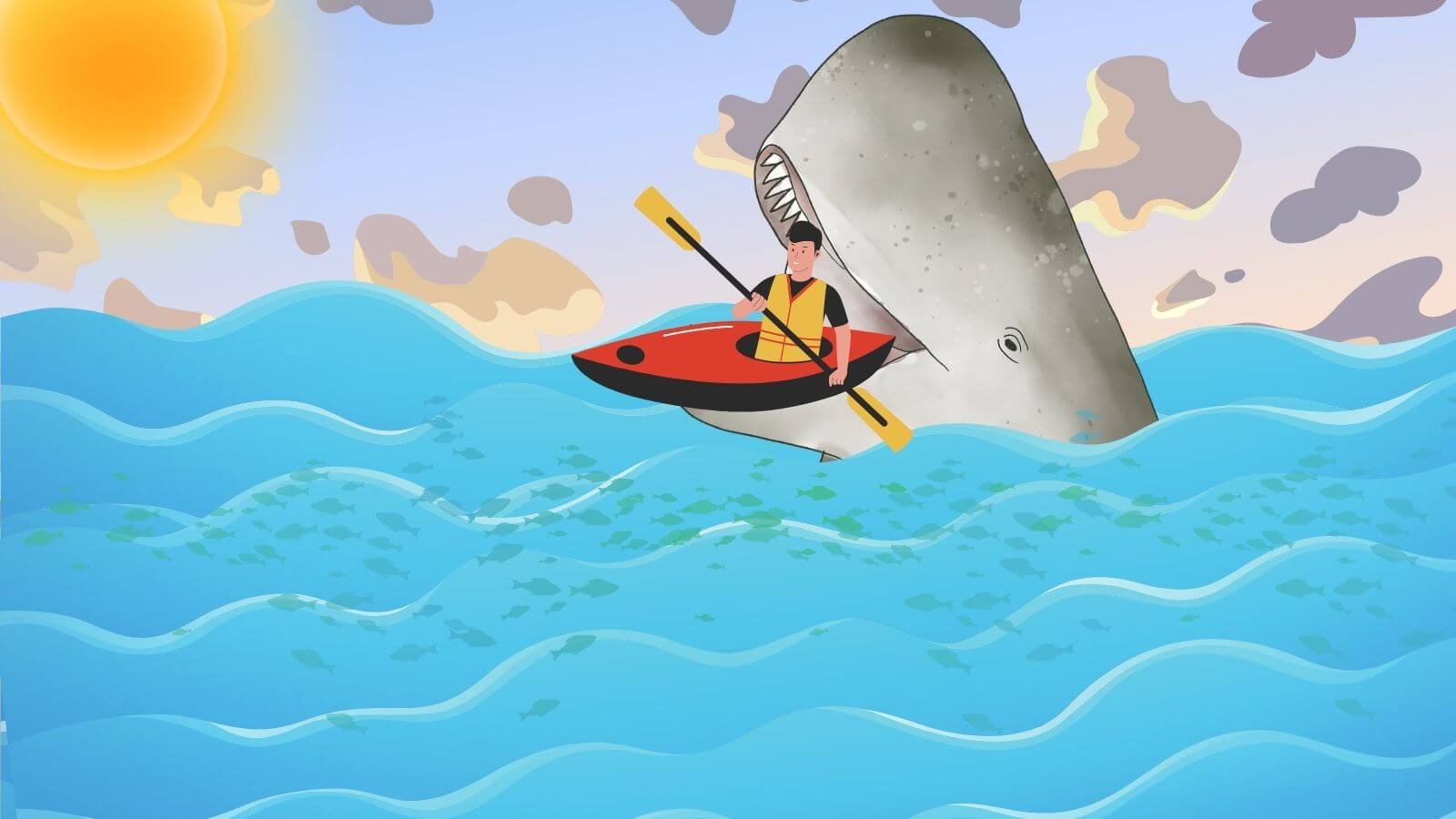Man almost swallowed by whale is a lot chiller about it than Jonah was
A humpback whale briefly scooped a kayaker in Chile into its mouth

Jonah, is that you? Courtesy of Mira Fox
The biblical story of Jonah has always seemed rather fantastical; after all, who could survive in the belly of a whale? Since when do whales swallow people?
Well, since this week, apparently; a man kayaking off the coast of Chile was briefly engulfed by a humpback whale. True, he wasn’t swallowed — the whale spit him back out a few seconds later — but it’s still pretty close to the story from the book of Jonah.
The man in question, Adrián Simancas, 23, was remarkably calm about the experience, which his father captured on camera. “I realized that I was in something’s mouth and I had been eaten,” he told the Associated Press. “But when I got out, I understood that, of course, it was probably out of curiosity that the whale had approached me, or maybe to communicate something.”
It’s unclear if the whale was trying to teach Simancas any sort of lesson, but in the bible, the whale was definitely trying to tell Jonah something.
God tells Jonah to let the city of Nineveh know that God will destroy it for its sinfulness. Jonah doesn’t want to, for whatever reason, so he flees to a ship. A storm surrounds the ship and the sailors throw him overboard — at Jonah’s own instruction — where he is swallowed by a large fish. He prays to God from the belly for three days and nights, finally promising to deliver the prophecy, and the fish spits him up onto land.
Jonah hurries to tell Nineveh that it’s doomed. But the city repents, and God forgives the people, which frustrates the prophet — after all, why all the drama if nothing was going to happen? He goes to sulk in the desert, where God scolds the prophet, telling him to have more empathy for Nineveh, and the story abruptly ends.
What to make of all that is about as hard as finding meaning in the Chilean whale incident. The book of Jonah is famously enigmatic; Jonah is petulant and ungenerous despite being God’s chosen prophet, and we never really learn why he’s so pissed off. He gets mad at God again approximately five minutes after he gets back on dry land. Some interpretations posit that Jonah was attempting to protect his credibility as a prophet because he knew Nineveh would repent, God would forgive the city, and his prophecy wouldn’t come true. Others say Jonah was actually trying to protect God’s credibility.
Since the book is traditionally read publicly on the afternoon of Yom Kippur, it’s often seen as a parable about repentance. The people of Nineveh repent for entirely self-interested reasons, donning sackcloth and ashes in the hopes of staying alive. Yet, to Jonah’s annoyance, even this shallow repentance is enough for God, This interpretation focuses on humanity’s inability to fully understand the ways of God or the impossible balance between a just world, in which sinners are always punished, and a merciful one, in which forgiveness is possible.
In the interviews after the humpback whale spat him back out, Simancas does not seem like a petulant Jonah; he’s even generous toward the whale’s intentions in scooping him out of the water. And, unlike Jonah, he reflected on the experience, saying the whale swallowing “invited me to reflect on what I could have done better up until that point, and on the ways I can take advantage of the experience and appreciate it.”
In the biblical tale, Jonah never atones for his own sins of disobedience toward God — in fact he keeps begging for death, since the world is so frustratingly unfair. Yet he too is forgiven; he remains alive through the stormy sea, the fish’s belly and his desert wanderings, all thanks to God’s mercy. He has no control over his life; ultimately, it’s all up to God.
Of course, the whale swallowing is likely a freak accident, not an omen from God. Scientists said the whale likely did not intend to grab Simancas. Humpbacks often feed by charging to the surface with their mouths open to capture schools of krill or small fish, and probably the whale scooped up the kayak because it was in the same area; given that whales navigate largely through echolocation and kayaks don’t make noise, it didn’t realize the man was there.
But even freak accidents have a meaning, if you choose to interpret them that way. And while any whale swallowing highlights our helplessness in the face of the power of nature and God, perhaps the real takeaway comes from the difference between Jonah and Simancas’ reactions.
Jonah sounds like kind of a bummer of a guy leading a bummer of a life. Simancas, however, forgave the whale and found the whole thing inspiring. No shade to the bible, but that seems like the healthier approach.
















